#Multiple input options
Explore tagged Tumblr posts
Text
TMY Projector, Upgraded 9500 Lumens with 100" Projector Screen Review
Are you tired of squinting at your tiny TV screen, longing for a larger, more immersive viewing experience? Look no further than the TMY Projector, Upgraded 9500 Lumens with 100″ Projector Screen. This incredible product is designed to bring the magic of the big screen right into your living room. With its high brightness, impressive screen size, and convenient features, the TMY Projector is here…

View On WordPress
#100" projector screen#3-year warranty#Budget-friendly projector#built-in speakers#Cinema-like experience#Clear image quality#Compact and lightweight design#Easy setup#Full HD resolution#Hi-Fi stereo sound#High brightness projector#Home entertainment#Immersive viewing#Multiple input options#portable projector#TMY Projector review#Upgraded 9500 Lumens projector#value for money#Versatile connectivity options#Vibrant colors
0 notes
Text
okay let's cut to the chase i need to figure out the best way to do this so i am curious about yall's thoughts as readers
i have what will likely be a ~90k au which will have ~5 distinct plotlines that regularly interact or overlap, something like 10 relationships that i would consider as requiring tagging, 7 different pov characters, and a variety of tags that may conflict depending on the relationship/character/plot they refer to
my concern is that a single fic would come across as overtagged/turn people off to clicking into it, or deter folks who might be interested in one plotline/relationship but not in others. i personally balk a little at fics with a ton of relationship tags, etc, and i'm also concerned that folks who come expecting a tag to apply to one dynamic will be surprised or irritated when it actually applies to another, etc
my tentative solutions are...perhaps a bit unwieldy, but i would love some input from the reader side!!
one alternate would be to utilize series as a way of better tagging each section of the fic, either as a single series of 30ish fics in chronological order or as multiple series of 30ish fics that align to the various plots (with a collection to aggregate them all) with appropriate overlap where it makes sense. my concern is a reader coming in and seeing "part 16 in series" and going 'oh well shit i don't wanna read 16 other fics before this one just to get what's going on here', which could potentially happen with either series solution
my other alternate would be a collection for the au with a "choose your own adventure" type of link at the bottom - follow chronologically to the next fic in the au or follow to the next fic in the particular plotline that this fic is a part of. this would probably also necessitate an author's note at the start of each fic with the 'previous' fic(s) linked. the struggle with this ofc is potential confusion in seeing it as a standalone fic when it's ultimately more part of a collective whole story (either in its plotline or with regards to the au as a whole), but would resolve the tagging issue and the potential deterrent of a 'there are how many fics in this series? no way i'm bothering with that' vibe
so my question, dear readers, is this:
i'm leaving this open for a week, and please feel free to rb to your heart's content! would love to know what people outside my circle think as well, or if anyone has any clever solutions or ideas even if they're not a regular reader of mine. thank u all dearly!!!
#poll#writing#this is for a bllk fic but frankly i'd love input from any readers#or writers who have perhaps attempted something similar!#i'm sure i'm not capturing all the possible problems#nor all the possible solutions#my main concern with having ~5 fics that contain each plotline#is that the plotlines overlap and interact in ways that might be hard to contain#without functionally reposting chapters in multiple fics#which i suppose could be another option but it feels a little weird#and also makes the idea of reading the whole chronological story in its entirety basically impossible
22 notes
·
View notes
Text
Every couple of days, there's a game I like to play called "what's the latest tumblr brainrot I'm gonna have to add to my 'filtered tags' list?" Well, I don't "like to play it" so much as "have to do it because for some reason, you can't decide that there are certain posts from people you follow that you're not interested in."
I bet tumblr's super fun if the thing you like starts trending- or if someone you follow decides to start reblogging that thing like crazy- and clogging up your dashboard, but for me it's just "god, I hope there's not a limit to how many tags I can block..."
#not art#rant#i wish there was an option to block tags as you see them on your dash#instead of having to remember what the tag is- and god forbid if there are multiple versions of the same tag- and manually input it
0 notes
Text
Opinion Here’s how to get free Paxlovid as many times as you need it
When the public health emergency around covid-19 ended, vaccines and treatments became commercial products, meaning companies could charge for them as they do other pharmaceuticals. Paxlovid, the highly effective antiviral pill that can prevent covid from becoming severe, now has a list price of nearly $1,400 for a five-day treatment course.
Thanks to an innovative agreement between the Biden administration and the drug’s manufacturer, Pfizer, Americans can still access the medication free or at very low cost through a program called Paxcess. The problem is that too few people — including pharmacists — are aware of it.
I learned of Paxcess only after readers wrote that pharmacies were charging them hundreds of dollars — or even the full list price — to fill their Paxlovid prescription. This shouldn’t be happening. A representative from Pfizer, which runs the program, explained to me that patients on Medicare and Medicaid or who are uninsured should get free Paxlovid. They need to sign up by going to paxlovid.iassist.com or by calling 877-219-7225. “We wanted to make enrollment as easy and as quick as possible,” the representative said.
Indeed, the process is straightforward. I clicked through the web form myself, and there are only three sets of information required. Patients first enter their name, date of birth and address. They then input their prescriber’s name and address and select their insurance type.
All this should take less than five minutes and can be done at home or at the pharmacy. A physician or pharmacist can fill it out on behalf of the patient, too. Importantly, this form does not ask for medical history, proof of a positive coronavirus test, income verification, citizenship status or other potentially sensitive and time-consuming information.
But there is one key requirement people need to be aware of: Patients must have a prescription for Paxlovid to start the enrollment process. It is not possible to pre-enroll. (Though, in a sense, people on Medicare or Medicaid are already pre-enrolled.)
Once the questionnaire is complete, the website generates a voucher within seconds. People can print it or email it themselves, and then they can exchange it for a free course of Paxlovid at most pharmacies.
Pfizer’s representative tells me that more than 57,000 pharmacies are contracted to participate in this program, including major chain drugstores such as CVS and Walgreens and large retail chains such as Walmart, Kroger and Costco. For those unable to go in person, a mail-order option is available, too.
The program works a little differently for patients with commercial insurance. Some insurance plans already cover Paxlovid without a co-pay. Anyone who is told there will be a charge should sign up for Paxcess, which would further bring down their co-pay and might even cover the entire cost.
Several readers have attested that Paxcess’s process was fast and seamless. I was also glad to learn that there is basically no limit to the number of times someone could use it. A person who contracts the coronavirus three times in a year could access Paxlovid free or at low cost each time.
Unfortunately, readers informed me of one major glitch: Though the Paxcess voucher is honored when presented, some pharmacies are not offering the program proactively. As a result, many patients are still being charged high co-pays even if they could have gotten the medication at no cost.
This is incredibly frustrating. However, after interviewing multiple people involved in the process, including representatives of major pharmacy chains and Biden administration officials, I believe everyone is sincere in trying to make things right. As we saw in the early days of the coronavirus vaccine rollout, it’s hard to get a new program off the ground. Policies that look good on paper run into multiple barriers during implementation.
Those involved are actively identifying and addressing these problems. For instance, a Walgreens representative explained to me that in addition to educating pharmacists and pharmacy techs about the program, the company learned it also had to make system changes to account for a different workflow. Normally, when pharmacists process a prescription, they inform patients of the co-pay and dispense the medication. But with Paxlovid, the system needs to stop them if there is a co-pay, so they can prompt patients to sign up for Paxcess.
Here is where patients and consumers must take a proactive role. That might not feel fair; after all, if someone is ill, people expect that the system will work to help them. But that’s not our reality. While pharmacies work to fix their system glitches, patients need to be their own best advocates. That means signing up for Paxcess as soon as they receive a Paxlovid prescription and helping spread the word so that others can get the antiviral at little or no cost, too.
{source}
29K notes
·
View notes
Text
I'm working on my fangan script, and I've got a question for you all as players of the series.
Imagine that a character is in a particularly bad mood during one particular chapter. Also, this character will—ahem—not be around in any subsequent chapter.
#fangan stuff#i have the plot METICULOUSLY planned out down to the Big Fucking Reveal Dialogue for ch5 and ch6#but input on the mechanics and construction stuff is <3 <3 <3 <3#(also if you somehow remember this post in like. a year: there are multiple options & it's not necessarily who you think it is)
1 note
·
View note
Text
If you have ADHD or Don’t please consider filling out this form!
I’m doing a high school project with two of my friends about ADHD! We all have ADHD and are doing a project for our class mainly about how ADHD is affected by Dopamine we also talk about how ADHD works, how medication works, options for being non medicated and most of all experience from those who have ADHD! If you are interested please fill out this Google form Survey. It mostly multiple choice and if anyone feels uncomfortable at anytime feel free to not complete to survey or skip the question.
If you don’t have ADHD YOUR INPUT IS VALUED! We are studying how Dopamine affects other people with other mental illnesses and neurotypical people!
Thank you so much to anyone who fills out the survey!
245 notes
·
View notes
Text
I want to make my posts more accessible, but can't write IDs myself: a guide
[Plain text: "I want to make my posts more accessible, but can't write IDs myself: a guide." End plain text.]
While every image posted online should be accessible in an ideal world, we all know it 1) takes time to learn how to write image descriptions, and 2) is easy to run out of spoons with which to write IDs. And this says nothing of disabilities that make writing them more challenging, if not impossible — especially if you're a person who benefits from IDs yourself.
There are resources for learning how to write them (and if you already know the basics, I'd like to highlight this good advice for avoiding burnout) — but for anyone who cannot write IDs on their original posts at any current or future moment, for any reason, then there are two good options for posting on Tumblr.
1. Crowdsource IDs through the People's Accessibility Discord
[Plain text: "1. Crowdsource IDs through the People's Accessibility Discord". End plain text.]
The People's Accessibility Discord is a community that volunteers description-writing (and transcript-writing, translation, etc) for people who can't do so themselves, or feel overwhelmed trying to do so. Invite link here (please let me know if the link breaks!)
The way it works is simple: if you're planning to make an original post — posting art, for example — and don't know how to describe it, you can share the image there first with a request for a description, and someone will likely be able to volunteer one.
The clear upside here (other than being able to get multiple people's input, which is also nice) is that you can do this before making the Tumblr post. By having the description to include in your post from the start, you can guarantee that no inaccessible version of the post will be circulated.
You can also get opinions on whether a post needs to be tagged for flashing or eyestrain — just be able to spoiler tag the image or gif you're posting, if you think it might be a concern. (Also, refer here for info on how to word those tags.)
The server is very chill and focused on helping/answering questions, but if social anxiety is too much of a barrier to joining, or you can't use Discord for whatever reason, then you can instead do the following:
2. Ask for help on Tumblr, and update the post afterwards
[Plain text: "Ask for help on Tumblr, and update the post afterwards". End description.]
Myself and a lot of other people who describe posts on this site are extra happy to provide a description if OP asks for help with one! This does leave the post inaccessible at first, so to minimize the drawbacks, the best procedure for posting an image you can't fully describe would be as follows:
Create the tumblr post with the most bare-bones description you can manage, no matter how simple (something like "ID: fanart of X character from Y. End ID" or "ID: a watercolor painting. End ID," or literally whatever you can manage)
Use a tool like Google Lens or OCR to extract text if applicable and if you have the energy, even if the text isn't a full image description (ideally also double-check the transcriptions, because they're not always perfect)
Write in the body of the post that you'd appreciate a more detailed description in the notes!
Tag the post as "undescribed" and/or "no id" only if you feel your current, bare-bones description is missing out on a lot of important context
When you post it and someone provides an ID, edit the ID into the original post (don't use read mores, italics, or small text)
Remove the undescribed tag, if applicable. If you're posting original art, you can even replace it with a tag like "accessible art" for visibility!
And congrats! You now have a described post that more people will be able to appreciate, and you should certainly feel free to self-reblog to give a boost to the new version!
808 notes
·
View notes
Text
In praise of good martial forms
One thing I alluded to earlier is that Suo has really, really good martial forms. As someone who dabbled with martial arts at various stages of my life, these details jump out. Of course, any martial artist worth their salt must have good forms, unconventional style or not (as Suo described the forms he learned as a "jumble of mixed martial arts"). Wind Breaker is one of the best choreographed manga I have seen, so these details are very much worth analyzing :P
Table of contents:
Martial arts start with good forms
Suo v. Oobiki: Is Discipline Rigidity or Fluidity?
Foundational Grounded-ness: Defense as Offense
Circularity; Yin and Yang
Suo on the Offensive: no_fist.megamind?
I will first go over the basics — how the choreography demonstrates Suo's solid skills, which segue into Suo v. Oobiki's debate about "discipline" (spoiler: Suo wins because he has better forms, i.e. better discipline), then moving on to make more observations about his styles— particularly the circularity and how the narrative is restraining Suo from using his fist to attack.
Martial arts start with good forms
As an introduction, I will note that Suo always sits and stands very properly, with his back straight and his posture supported by his hands behind his back.
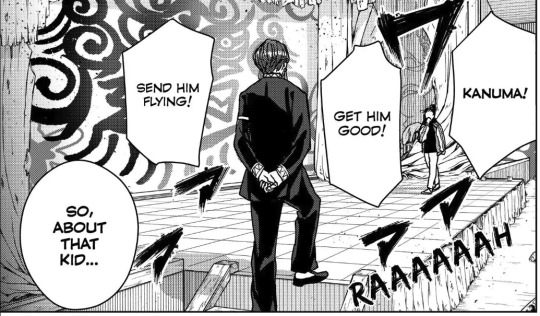
Notice also that while Sakura casually leans back against his chair, slumping backward, and Nirei "cowers" -- leaning forward -- Suo sits straight-backed like the epitome of a polite young man :3c

This is another fun contrast between Suo and most other delinquents in the story— in an environment emphasizing rebellion, freedom, and a bit of teenage arrogance mixed in, sparking all sorts of wild and flamboyant self-expressions (dyed hair, undercut, piercings, etc.), Suo alone stands with a very traditional, conservative, and almost a prudent sensibility, in both his clothings and behaviors. Had he not don his Furin jacket, would anyone believe that this gentleman is a delinquent?
That is to say, Suo's trainings are baked into his bones, to the way he holds and moves himself, most likely to even his speech. Good forms from the beginning to end. Suo likely has practiced martial arts for a good while.
The thing that makes me notice how good his form is is from his fist placement in the Kanuma fight:
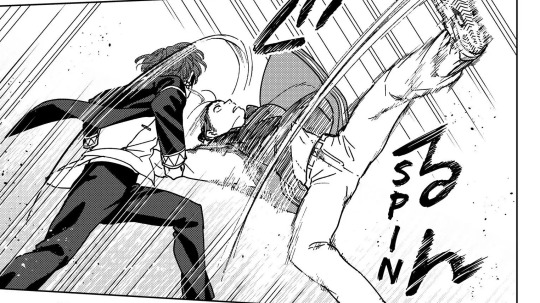
First, note that Suo's right fist is in the ready position by his hip, ready to hit. It's small, but surprisingly easy to forget when you are starting out. It's somewhat about being ready to punch at anytime (even though we never see Suo actually punching anyone), but more about the discipline of always being ready for your next move.
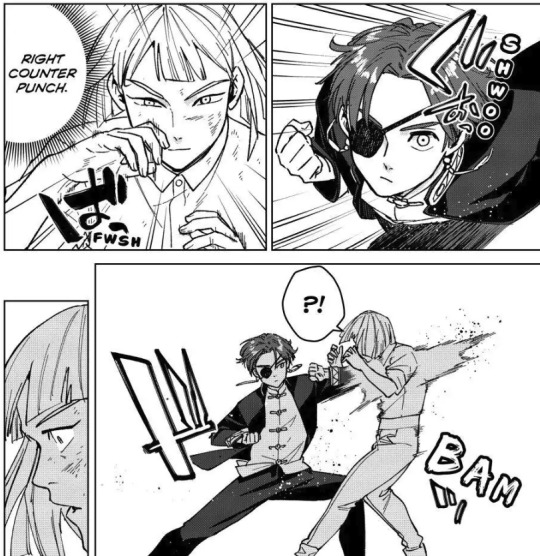
Similarly, the fist is there during the Oobiki fight. Note that Suo was able to surprise Oobiki and get a hit in because the ready-to-go fist exists as a camouflage, distracting the opponent from his other arm (out of frame— out of Oobiki's visual field). Having the fist there is an excellent basic form, and it allows Suo multiple options of attack.
Let's transition to legwork. One of the most important thing in martial arts is stances. Generally, the deeper your stance is, the lower your center of gravity, hence the more stability you have. This is, of course, at the cost of mobility, which is achievable with narrower, higher stances. An exercise at the advanced (masters') level of karate is to stand in kiba-dachi, the basic horse stance (first thing you'll ever learn) continuously for an hour or more. That's how strong your legs have to be. And practice staying in proper stances is how you hone it. Having a strong, solid stance is essential for balance and power,
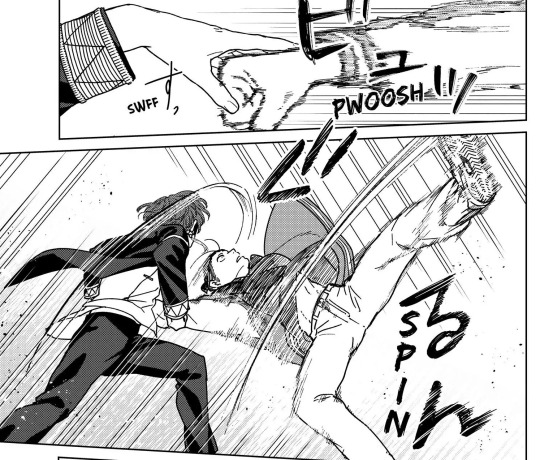
Notice the solid, deep (low) stance— and how much power is behind it as Suo very gently seize Kanuma's fist and flips him. We can see the difference in speed (and thus input power) by the blur in both frames.
Again and again, Suo does a lot of "flipping people over" like this (I'm sure there is a proper term for it, in what I assume is Aikido, but that's a martial discipline I haven't flirted with lol). I will labor the point of Suo's moves being primarily circular later, but just to demonstrate the power behind his seemingly-effortless moves:

Note the stance— and the engaged legs muscles
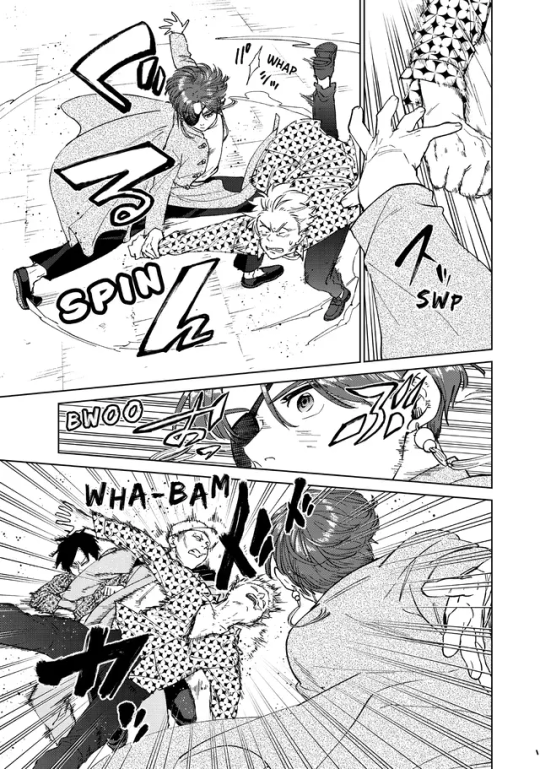
Same here— the deep stance provides a tremendous amount of power required to fling a grown man and knock out two more people. Note again the difference in speed/input momentum (top right panel).
Doing mixed martial arts doesn't means that every move is a hodge-podge of everything. Suo's starting stance is a very basic/common starting form in kungfu:
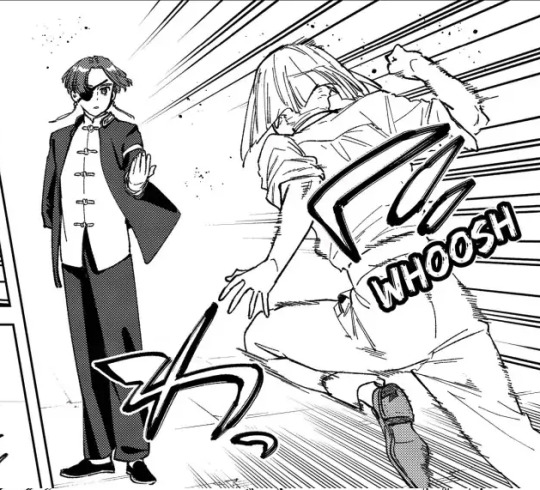
As a side note, visually this starting form is very representative of Suo as a character/fighter :P He doesn't start (seemingly) looking for a fight; his stance is neutral, relaxed; one hand is inviting the opponent into his space. However, when we look closer, his feet are position such that he is ready to lunge forward (front-facing leg) and a fist is hidden behind his back, also ready to pounce.
It is a basic stance because it is good, and great when done right. If there is one (1) single thing you get from all the ramblings I do, let it be that Suo has very good basics. From his resting stance, fist placement, low stances, to kick— everything is solid.
This brings us to the "debate" between Suo and Oobiki about what "discipline" means.
Discipline: Rigidity or Fluidity?
Suo v. Oobiki is, ultimately, a fight about their philosophy regarding "discipline". (In this manner, we can say that Suo participated in at least one conversation, lol. But more on this later in Crisis of Contact or The Failure of Language (coming soon. at some point.) perhaps.) Firstly, Oobiki brought up discipline with the context of punishment for bad behaviors:
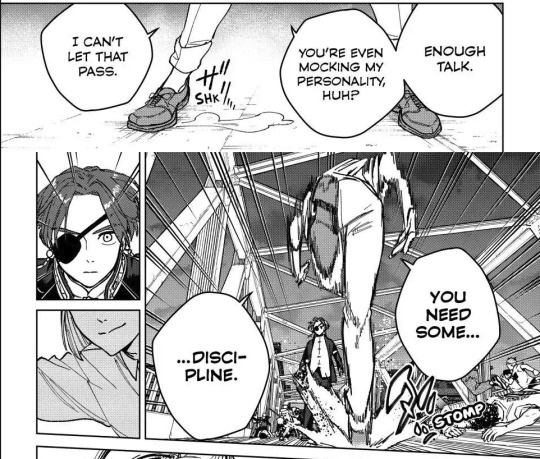
Which suggests that a (rigid) social code was violated here— which is that Suo, the underclassmen, had insulted his superior (in age and school-year). Discipline, here, is a violent mean to "bend" someone back to the appropriate behavior; or, perhaps, discipline means the rigid code of appropriate behaviors itself. Regardless, we get the sense here that "discipline" is rigid, meant to be followed to the letter, and even somewhat hierarchical: the elder enforces discipline onto the younger, not the other way around.
Ironically, this rigidity and hierarchy of discipline is what Oobiki forsook in the first place when he gave up competitive gymnastics:

Rigid routine, rigid rules;

The hierarchy of ranking and rigid scoring system;
And yet, old habits die hard. The brutality of competition and gymnastics is engrained into Oobiki's conception of discipline, and what it means to be, yourself, disciplined, or to discipline somebody else: beating the same stringent routines and rules until submission.
Afterwards, Suo relays a very different view — another definition altogether — of the word:

(Yeehaw! The first visual of Suo's master--- the same narrative role as Akari, yet so much further away...)
Discipline here is not a rigid code of rules or behavior, but rather the transmission of knowledge. This may be due to localization (can somebody please supply me with the Japanese version), but notice that Oobiki uses "discipline" as a noun, while Suo uses it as a verb. One is a thing that you have; the other is an action you impart upon someone else. Already, we see the rigidity of an object without care for whom it affects, versus an action that involves two people at the minimum (the teacher and the student) and widens the possibility of what could be taught. Martial arts is a discipline; so is calligraphy, for example, or tea ceremony, or life philosophy, or math, or science, or literature, etc.
Discipline, to Suo (relayed to him by his Master, by the quote) is a living, mobile thing, means to share knowledge without forcing it upon somebody. You can try to train or teach someone; it doesn't mean they will learn it that exact way, or they may modify your teachings to their needs. Suo is already innovating upon the discipline passed down to him by teaching Nirei to protect himself and fight back at once

It's a living thing in the same sense that humanity is a living thing, as culture and knowledge get passed down and modified generations by generations. It's quite generative, to employ a pun here. It's more philosophical and metaphysical than the concrete, object-like "discipline" that Oobiki wants to impart, or force upon, others.
How do these two views of "discipline" duke it out? By fighting, of course! And, I will argue that Suo wins because he has the better discipline, narratively speaking. Of course, it's nearly impossible for two definitions of the word to duke it out— this is why we have stories and narratives :D The key observation I want to make is that Suo has the more solid and proper forms.
I noted earlier that Suo was able to get a hit into Oobiki with his elbow because of his good ready stance with the fist. The more demonstrative example, I think, is in this sequence here, which immediately follows the aforementioned example:

Oobiki begins with a gymnastic-inspired cartwheel, using one leg to attack and hook Suo's arm down. Note that the force is concentrated on Suo's wrist. With his momentum, Oobiki's arms push upward to complete the cartwheel, and, theoretically, slam Suo's body down by his wrist (a very tiny fraction of Suo's body mass— which is proportional momentum). That's cool and all, but I think Oobiki makes a grave mistake next…

... of attacking with his other leg instead of landing. He expects Suo's whole body to go down with his wrist (which, again, very small fraction of body mass— Suo is a lot stronger physically than Oobiki expected). If that is the case, then Oobiki gets the point. However, I think, giving yourself zero point of contact on the ground — your form and stance not being grounded at all — is a risky gamble. You risk standing on nothing and having no foundation beneath to push you on. While you are falling mid-air, your opponent easily get a grasp on you, and, supplying some (seemingly) minimal amount of force, turns gravity against you. Again, no foundation, nothing solid to land on.
This is, also, the last significant movement in their choreography before the winner is decided. This ending is signified by Oobiki saying, "I can't read you at all..." before the narrative naturally descend to the conclusion of their fight with Suo as the winner. Oobiki's "encore" is merely the last desperate swipe in a conversation already closed.
Foundational Grounded-ness; Defense as Offense
Another observation: throughout the Oobiki fight, most of Suo's stances are low, deep stances, which emphasizes stability and grounded-ness. We see these in the previous examples— in the one immediately above, Suo's stance is so "deep" that he is kneeling on the ground: very stable (which also necessitates no small amount of core strength, mind you) in contrast to Oobiki's ungrounded-ness.

Here, Suo starts from a neutral, high stance, then steps out and down to move his opponent down along with his own center of gravity
Next, a very impressive (holy crap I can't properly express how fucking insane of a move that is) swing: from a low (kicking) stance, which provides the normal force necessary to push, and over


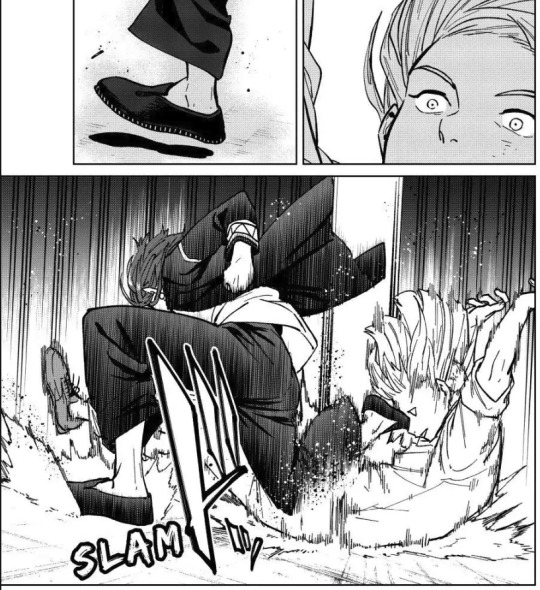
To a solid, whole foot (HEEL FIRST! THIS IS VERY IMPORTANT-- note the angle where the heel is closer to the ground) and a forceful slam down.
While Suo adeptly utilizes high, middle, and low stances, I want to point out that in this fight, all of his move begins from a low stance. Narratively, Suo is focusing on stability, grounded-ness (purpose-wise, Furin's job is to hold their ground, too), and defense — which is his specialty. Suo rarely initialize attacks as offense; here, he relies on the same grounded-ness of his defensive practice as offense. You have heard "the best defense is offense" before, now, welcome to "the best offense is defense" :P.
Combing through the manga, I am struck with how solid Suo's stances are, which I'm sure I have more than adequately emphasized by now. He is agile, mobile, and responsive, yes, but he agilely steps into a sturdy defensive stance in every fight, as demonstrated above in the Kiryuu introductory fight as well as in Roppo Ichiza.

I think this does say something about Suo as a character; just as Sakura's agility, adaptability, creativity, and ferocity says about his, or Tsugeura's high-spirited, principled (even if seemingly odd) virtues being supported by his muscular sturdiness— emphasize the simplicity of pure force, or, Sugishita's long-armed, forceful, but single-trajectory attacks says about his single-minded determination. It doesn't have to be anything too deep lest we step too close into Backstory Speculations territory (though I would not blame us for that, seeing that that is the #1 mystery right now, lol). But, to me, there seems to be an interesting contrast between Suo's image as a lighthearted, blithe, socially-adaptable child and his principled and grounded stances, which are primarily employed to protect or defend someone else.
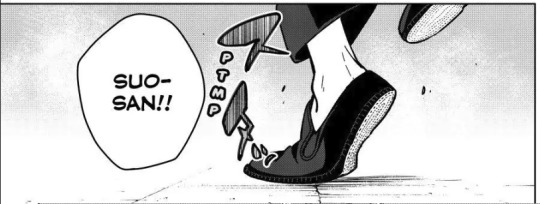
(Suo's return to the group post-Oobiki is blithe and lightfooted. At this moment, his return is more to a social effect, reconnecting with the rest of the class before the fight resume. Note that, in contrast to his earlier heel-first landing, toe-first landing is used for very light landing— a spirit of windless calm, as I love to say these days. His first impact is this lightness — relieving Nirei from his post, signifying a victory, like a balm upon the toiling soldiers.)
There is, still, a hidden sternness and practicality underneath such a light and humorous character. We caught glimpses of it: Suo who, on the first day of class, "fact-and-logic"'ed Sakura and Sugishita into resolving their conflicts:
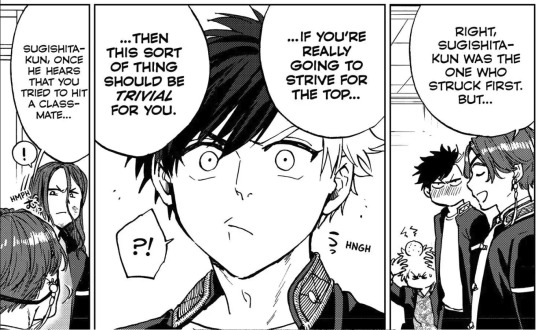
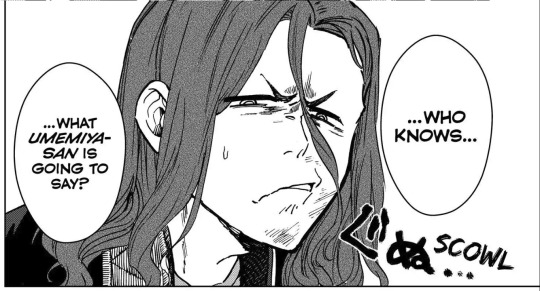
Suo who represents the foundational philosophy of fighting as a group to Sakura:

Suo is also teaching Nirei the foundation of fighting, etc. etc.
These roles fit perfectly into his motif as a "teacher" in the narrative, conveniently also as the narrative mouthpiece: I discussed in another analysis Suo's role as the one delivering "conclusive remarks" — the final deliverer of message to Sakura's journey. Just like his conception of discipline as "passing down teachings" — passing down something fundamental, grounding, upon which new innovations can be made — Suo provides the elementary, foundational "bricks" to the story, upon which Nirei, Sakura, the audience, and whomever else he will teach next, can build up their unique substances. It all starts with a good basics— that’s the thing that struck me with Suo’s fighting styles: it’s graceful and simple, based on strong and solid foundational skills.
Circularity; Yin and Yang
By now, it's clear that Suo's fighting motif is primarily circular: he twists and flips his opponents both parallel to and perpendicular to the plane of his body
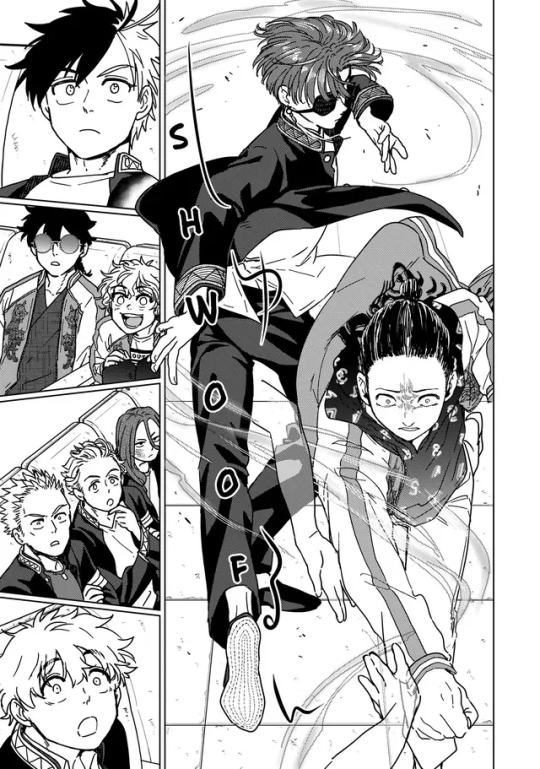
@darkersolstice and I briefly discussed this point earlier, here, where they insightfully compare Suo to the eye of a hurricane. Inspired by this, I remarked that the philosophical basis of Suo's style is something to the effect of "A steadfast heart amidst the ever-turbulent circumstances" (In Vietnamese, "Tâm bất biến giữa dòng đời vạn biến"). As the calm in the eye of the storm — the central, unmoving axis of rotation — Suo controls himself and the vortex of life such that they all pass by him. He sees and acknowledges the turbulence; but he remains unperturbed and untouched by them.
There is a nuance between what I argue here versus what I argued by Suo's evasiveness, in that it is not the fighting style that is the evasive one, but Suo is. The evasiveness — the "letting life flows by" physical philosophy — is just one of the many possible motivator for his evasion. The bulk of Suo's dodging, I think now, is social rather than physical; the physical aspect just further enforces the motif. (Or, I may argue, the physical aspect may hints towards a deeper motivation for the habitual deflection, without it being the main culprit of the evading act.)
Coming back to the circularity itself; the perfect circle has been symbolically important, throughout many culture, as a symbol of perfection and completeness. The Aristotelian view of the universe was that of a series of enclosing sphere, because circles — and spheres — are perfect. In Chinese philosophy, the same ideal is reflected in yin and yang
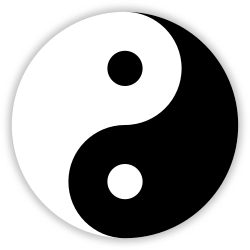
There is light in darkness, darkness in light, as circular force and motion rotate in the universe. This is the total encapsulation of everything. Suo's circular form, where he controls the sum total of his force and the opponent's momentum to his advantage, symbolize this philosophical totality. By Suo's association with a heavily Chinese motif, this could be the intended basis of his form.
Suo on the Offensive? no_fist.megamind?
Another thing that is apparent is that Suo has yet to (actually) attack with his fist; both time, against Kanuma or KEEL, he was thwarted from doing so:

Both time, Suo going for the punch was considered an excessive use of force— explicitly so in the KEEL's case, where it was considered the wrong and overly-aggressive choice. There, it also marked a break from his serene and mature characterization.
Suo does attack— but it is always with his legs, palms, or elbow (in the Oobiki fight).


Never the fist. Why?
I, to be honest, still have to ponder more what this means in relation to the rest of his defensive, circular (yin-yang), and deflective (utilizing the opponent's momentum) fighting style. An oath of non-violence, perhaps?— an oath to respond to your environment, to defend as the need arise, to seek not violence but repel it? These are compelling statements. Why kicks and push, but not fist? Perhaps there is an "excuse" of repelling and deflecting in kicking away, pushing away that does not exist in punch in, punch at, punch through. With its various prepositions, punching is rarely away, but always offensive, violating, stepping inside in a sense. Suo's discipline seems to be that of pacifism or at least, minimal violence. Violence cannot touch him, and he cannot exude violence with the discipline he was taught— handed down to? constrained in?
There are still so many interesting thoughts to extrapolate on, so many narrative trajectories wide open for Suo (and his backstory) to take— but that shall be the story for another day.
#hiiii guys im back and i know that i have 238573829 other analyses going on BUT i promised myself this was quick easy and free#it was free but not as quick and easy as i thought.#alack. hubris.#also realize i have a character type: narrative mouthpiece#i love character who know what they are saying (real)#rccl#wbk#wbk meta#wbk analysis#wind breaker#wind breaker meta#wind breaker analysis#suo hayato#suo's master#oobiki kaito#noroshi arc#well well well. today i am outing myself as 1) half-assed multiple forms of martial arts (i went through 4) 2) vietnamese#if anyone else is vietnamese feel free to say hi.#cant u tell how much i love suos fighting style#Backstory Speculations#thank you anne carson#yet again#i barely edit this probably will do so in bed. as it wont to be
94 notes
·
View notes
Note
Hi, hello, big fan of your game, Slay The Princess.
I'm sorry to bother your amazing dev team, I don't mean to be rude, so feel free to ignore this message.
But I've played STP on Playstation 4, and I'm suffering massive lag problems that I think shouldn't exist.
I'm sure the problem has already been notified by other users, but I wanted to bring it up again on your blog if you are willing to listen.
The lag problems basically affect every single aspect of the game, from saving and loading to just navigating the main menu; scrolling through the dialogue options is a chore that requires weird back and forth gymnastics from my controller, in order to reach the bottom I have to calculate my inputs hoping that the game would register them.
The game is especially a nightmare in The Nightmare route, where I guess the Princess' animations creates so much lag that, at a certain point, the game stops responding (you can tell because you can't hear Heart Lungs Livers Nerves in the background anymore). In order to complete this path, I had to close and reopen the game multiple times (since apparently, the game runs better once you just start it), consume as soon as possible all the dialogue options first available until I reached the bottom options (I couldn't scroll down through them, because the game would freeze before it'd load my inputs), and once I reached the "Leave with her" opinion, I'd click it before it was too late (I didn't bother with the other option for fear that it lead to a third chapter that continued the lag).
The game froze some more times on our way out of the cabin, and I had to reload it over and over again and skip some dialogues, to maximise the game's ability to run. It even crashed once I went out of the cabin with the princess, though thankfully, it wasn't a repeated problem, and in the end, after 10 startups, I was able to complete the Nightmare route.
Despite, all the lag issues, I still really enjoyed your game!
I actually liked it even more than Hades, another famous Indie Game that I've been playing these last couple of weeks, which is a lot I can say about a game that I was basically forced to close due to freezing during it's final "Boss Fight" (yep, the game froze once again during the Shifting Mound section, during, you guessed it! The Nightmare part of the confrontation).
I hope these issues could be fixed, but I also hope you are enjoying your game's success regardless of everything I just said, you really deserve it.
Have a nice day!
Oh, also:
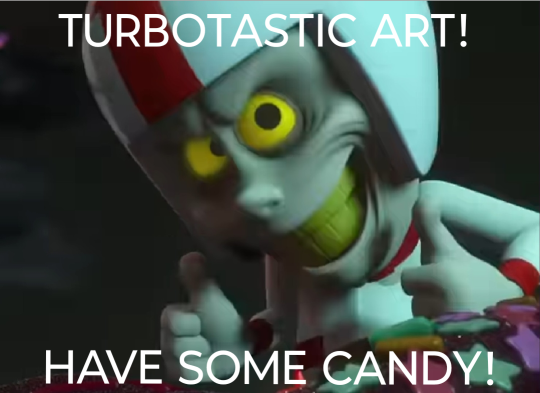
Hi! We've started receiving reports on this recently, so I'm guessing this might come from issues wrt the latest console update. I've passed this along to our console publisher and porting team, but in the meantime, you can probably address those issues in the short-term by turning off first flickering images and then, if the issues persist, the boil effect in your preferences.
156 notes
·
View notes
Text
now that i've done two doll drops on ko-fi, i can say that it's vastly less stressful than commissions, for multiple reasons. i still want to open a slot for a full custom or two once in a while because i truly enjoy making them, but prints of existing dolls will be moving to the shop. drops will not be scheduled, but they may actually Happen, while commission openings just have not been happening.
AND SO i would love some input on what y'all might like to see in the store in the future. drops will most likely be 1-3 of the same sculpt in different color variations. you can leave a comment on this post, or send an ask if you want to be anon.
this decision also makes me feel a lot more excited about the prospect of doing custom commissions, and offering more elaborate options when i do. i'm planning to open two slots soon.
96 notes
·
View notes
Text
Something I really, REALLY appreciated with these last two chapters of Deltarune is just how much we get to see Kris fighting to act autonomously. We even get extended scenes of us completely removed from Kris and seeing how they act separate from our influence (though perhaps not the influence of others...) There have been glimpses of moments like these, such as when Kris acts on their own behalf during cutscenes. However, those are instances where we obviously wouldn't have much input beyond prompts for dialogue responses for necessary actions.
Something small but really impactful that happens multiple times between both chapters 3 and 4 is just how often Kris fights to control what we make them say to other characters. They'll cover their mouth, speak with their mouth closed, even bite their own hand very hard just to keep us from saying mean, misleading, or untrue things about themself or their friends.
I feel like in the past, we've had some indication that Kris says (most of, but maybe not all) of what we make them say, with the only indication of their feelings on the matter being how they say it. They'll mumble or say it creepily, or shout, or grumble, prompting responses from others (usually Susie) to comment on how they said the thing but Weirdly. This time, there's way more emphasis on Kris outright refusing to say things.
I'm particularly interested in a moment between Kris and Susie near the end of Chapter 4. If you go to the lake spot where you usually see Onion-san (who does not appear this time), if you wait for a while, both Kris and Susie will sit down together. If you wait for a fairly long time (I tend to wait until the game itself tells me there's no more dialogue to be earned with my persistence), a prompt will show up. It gives you the option of saying nothing or telling Susie what is on your (Kris') mind. If you choose that option, Susie asks Kris why they're talking with their mouth closed.
That's such an interesting moment to me, because I think it's an example of Kris wanting to tell Susie something, but not us. Kris wants to say it, but not let us hear it. This idea is also brought up in a delightfully awful scene with Noelle, if you did Snowgrave route.
I'm just... really, really glad we got to see more of Kris. The one and only thing I truly hope to see before this story is ends is that we get to see Kris act totally autonomously, without the threat of us or others influencing their behavior. I want to know who Kris is, how they feel about things, how they'd act if they could act as themself. I'm glad these last two chapters gave us a glimpse of that... I really, really want to see it!
87 notes
·
View notes
Text

Ꞌꞌ bnha dr quirk ! ? ꒷꒦



── ﹒quirk name: aetherdrive
─ quirk type: emitter
─ quirk desc: ﹒ my quirk allows me to instantly manifest, alter, and manipulate physical weapons or constructs through tactile sensory input. my body becomes a living forge, drawing from both the surrounding environment and my inner energy to create custom, aether weapons that adapt to my emotions, surroundings, and combat data.
─ strengths: ﹒ i can manifest any weapon or object i've touched or seen before, meaning i'm never out of options.
﹒i can adapt to my weapons, stance, and strategy mid-fight based on my emotions, surroundings, and enemy behavior.
﹒my skin literally feels molecular tension, motion shifts, vibrations in the floor, the emotional feelings of my opponent.
﹒i can sense incoming threats through the ground, map surroundings through contact, feel an enemy’s next move, and manifest a weapon to match it all before it even happens
﹒the more emotionally connected i am to a weapon/object/situation, the more powerful, durable, and responsive the construct becomes.
﹒my brain treats all input (sight, sound, sensation, memory) as blueprints.
﹒i can control multiple forged weapons/constructs in the air, redirect mid-flight, have them orbit, defend, attack, or spin.
﹒i can instantly manifest weapons and constructs without a delay.
﹒i excell in close combat, short and long-distance fighting, and no matter the terrian i can easily adjust.
─ drawbacks: ﹒ since my quirk processes thousands of micro-inputs every second like touch, emotion, vibration, tension, and instinct, if too much data floods in, i risks having a synaptic overload, migraines, blackouts, and nosebleeds.
﹒ my quirk is emotionally reactive meaning i have to keep my emotions in check so if i'm feeling detached or upset my weapons/constructs may take on an unstable form, glitch, shake or just flicker out.
﹒ my quirk works from external materials but also drains internal energy if needed for speed or for large scale attacks.
﹒ i need to physically touch or observe a weapon/material to replicate and manifest it properly.
﹒ if im using telekinesis to control too much objects it gives me a mental overload.
﹒ since my hypersensitive input allows me to feel a lot but that also means even a mild hit feels way worse.
﹒ the more intense or complex a weapon/construct, the more it strains my muscles and bones.
─ xtra: ﹒considering touch is my "main" input but my eyes..i can understand a weapon/building/material weakness just from looking at it and taking in its structural flaws to which gives me an advantage. i can lowkey see air pressure movements, micro twitches, vibrations in the environment.
﹒by touching a person i can feel micro muscle tensions so like lie detector who?? and i can pick up on emotions as well as their kinetic memory, emotional residue, or muscle memory signature so like how a person fights.

#੭୧ etrnvlr ੭#⠀⠀𓇼 ◝⠀⠀luan⠀⠀:⠀☆#shifting#desired reality#reality shift#shiftblr#reality shifter#reality shifting#shifting community#shifting motivation#shifters#shifting blog#mha dr#mha shifting#mha#mha oc#boku no hero academia#bnha#my hero academia#bnha oc#shifting realities#shifting antis dni#anti shifters dni#black shifters#shifting script#shifting memes#shiftinconsciousness#shifting to desired reality#shiftingrealities#shifttok
56 notes
·
View notes
Text
On A(yin) and Unreliable Narration - or, "Did They Hate Him, Really?", the Story of a Depressed Man
One of those funny things about Lobotomy Corporation is that, just like many, many games out there... it puts you into the shoes of the protagonist. Almost literally, as it's designed to look like a player insert game.
But, see... it isn't.
The similarities are - at the start - that you seem not to have a name, you can't see what you look like, there's a character helping you and explaining the world, you're amnesiac, and you're suddenly given something big to do.
Those fall apart really quickly.
(Spoilers/references to endgame LobCorp, Ruina and Limbus as well in the post.)
Firstly, Angela tells the player their name. Or rather, that you are now called "X." She does not give you an option of which name to input, just as later on, Faust does not give the option to name "me" in Limbus Company and the player character is named "Dante." Both times, that decision is taken out of the player's hands.
From this moment forth, you are not playing "you," you are playing as a character that the developers have named, characterised, and already decided on. And this shows itself through all of the choices they take from then on, and the story they take you on.
Just focusing on "X," we don't often get to see what he's thinking and feeling himself. The very, very few times are usually either a multiple choice question, or right at the very end - and no matter what, he doesn't speak very much. He uses short sentences... from what we can see, at least.

This is on Day 5, but... you get the idea. X doesn't really say much more than this at a time.
But- wait. Look at that. Here's something interesting that I loved picking up when going through Persona 5-
The fact that each one of these comments is simply a sliding scale of the same thing.
You, as the player, literally cannot have X say to Angela here "I've been having a great time! Absolutely loving it, thanks." Because that... isn't how X feels.
The truth is that as of Day 5, X has only got memories of the past five days. His entire life has been one of managing a facility of death and fear, with everyone looking to him for guidance. No shit he's going to say that his life has been awful.
Which handily already gives him defined personality characteristics that do, actually, stick with him all the way through to the endgame.
This is someone who does not enjoy being in a position like this. He does not enjoy seeing wanton death and destruction. He does not like being in charge, and responsible for everything.
All of which neatly destroys the player's ability to insert themself into the Manager's role as themself, and take control. This is his company. You are playing the managerial equivalent of a first person shooter with your character on mute most of the time, but everyone else can (effectively) see and hear him as his own person.
Which leads on to the biggest thing:
How do the others interact with him? How do they see him? Does he say things that we don't hear? What are their opinions of him?
Now, the ones we get to see X through are really just the Sephirot, Carmen (to a degree, through memories) and Angela. There's the Keter, but they're a special case.
It's basically impossible to talk about "Manager X" without looking into his past as "A, the Founder of Lobotomy Corporation" - or, rather, as we find out on Day 50, "Ayin."
Because each of them are simply one part of a whole, really. And the simple fact is that the only reason I tend to differentiate them with calling the character from the start "X" and the one later on (from around the mid-point onward) "A" is that this way, we know which point in time we're talking about.
All of them are however, ultimately, all Ayin.
"It's all Ayin, all along?" "Always has been."
Now, the easy part is to say "the Sephirot hate Ayin!" and... to be honest, that's kinda true. They do not get along. Any of them- no, Hokma, we're not talking about you, you're an outlier and should not be counted for this. Sit your gay ass down.
Truth is, as Kali/Gebura said, after her suppression:

ID: "When we first reawakened in metal, we could feel the exact moment our final breath stopped, lodged into us like glass shards."
So, effectively, they're like angry ghosts full of resentment that have never been able to move on from that unfinished business. And, unfortunately, all of that unfinished business revolves around Ayin, the character we're playing as. No wonder they're all angry at him! and that's not even taking into consideration the issues they'd have had before they died!
So: Malkuth is mad because her resentment stems from desperately wanting Ayin's praise and attention as Elijah, to the point that she pushed herself further than she should have, did something he hadn't given the approval for (but Carmen did), and died horribly for it, with him not able to face something horrendously awful happening to someone he'd tried to say "don't do that" to.
All she can see, however, is how she had tried her hardest to be noticed and still got ignored. That's where her meltdown comes from.
Yesod's comes from, basically, seeing the aftermath of Elijah's (awful, awful) death and gaining a level of OCD over it. I don't use that term lightly here; he gains an overly stringent obsession over rules and regulations, and believes that something may have gotten onto his skin, leading to him self-harming himself in order to get this off (and it is not there). Ayin, not having any surety that this is all just in Gabriel's head, orders an invasive examination to ensure that nothing infectious is actually going on. Remember: this is the City. They are in a laboratory. This is very plausible.
However, there never was anything of the sort, and Gabriel is simply more traumatised than ever. Both of them simply have to live with that now, and Yesod's meltdown comes from trying to - as he had as Gabriel - push down his grief and despair until it simply exploded.
Hod was a teenager at most when she was working for the lab in its original form, a nervous girl who Ayin warned - quite harshly, even! - what she was getting into with them. Carmen says "Don't be too harsh on her. She's amazing to be here at such a young age!" and the issue gets waved over like that. By the time people have died because of the experiments and they're handling abnormalities, however, she reaches her breaking point and... effectively calls the cops on them by saying that they're doing things that are Wrong, and because of that, the entire lab gets destroyed. Ayin remembers reading about her having died in the newspaper, and "never wanted [her] to die in misery, like that nasty tabloid article gossiped."
What is implied is that Michelle lived long enough to know that she'd made a massive mistake. She likely knew that instead of just having the company shut down and the research stopped, the Head was calling Arbiters on them. Perhaps whoever she told went "thank you for the tip-off, we'll deal with it" and when she assumed there'd be no bloodshed, she was corrected in her mistake. Whichever way, she knew what would happen, and she committed suicide because if she'd not wanted to face the things that she'd left behind, she couldn't live with the consequences of what she'd done.
Hod's meltdown happens because she's full of regret and she cannot move forward past the desire to be someone who hadn't been so weak to do such a thing in the first place. She wants to see herself as better than she was - but without having faced what she needs to be improving from.
Tiphereth's regret is, quite simply, that she doesn't understand why Enoch chose to die. The fact that Tiphereth B keeps malfunctioning for the same reason that she could never understand Enoch - that he asks questions about the meaning of existence - makes this harder on her. As Lisa, she never liked Carmen, and wanted to live in the moment, enjoying life as it was without thinking about it too hard, really. Enoch died, and she took it out on Carmen. We never really see what Lisa thought of Ayin himself directly, which places any ideas of how she saw him into headcanon territory.
Without Enoch, and knowing that he keeps coming back and hoping for something better, she ends up asking some of the same questions - "what are we doing all of this for?" - during her meltdown.
Chesed's is a cycle that's very easy to see how it's repeated with Angela. Ayin is told straight off by Carmen “He’s a bit pompous, so don’t believe everything he says." (Direct quote). Daniel continues to work with them, all the way through everything... right up until Garion comes along and terrifies the hell out of him into releasing abnormalities onto the lab, killing almost everyone.
Chesed's effectively forced to relive this over and over again via Angela telling him to do things that'll get the employees killed, keeping him in line with threats. Of note is the fact that with Carmen, Garion, and Angela, all of them hold levels of power over him. The phrase "No matter how great you may be, you will always be in the palm of my hand" is a recurring theme for him, and no wonder, when his trauma is based in the feeling of being used to hurt others no matter what he feels about that.
The other part is that when he truly needed Ayin to listen to him, during the Head's destruction of the lab, Ayin shut the intercom on him.
Gebura's is easier to quantify, much like Tiphereth's; she wanted to protect people, and her final moments that were etched into her head in the robot box form were of her rage at not being able to do so, and just wanting to lash out.
Hokma... okay, I will include Hokma here, because Benjamin's big regrets and resentments are that he didn't stop Ayin when Ayin went too far. He didn't see the signs and red flags saying "this man is not okay!" because he desperately wanted him to be okay. Because of that, he ignored his misgivings until he couldn't take it any longer, and left.
Binah is... interesting! At first, nothing seems personal. Other than the eternal torture, y'know. But then she does state that she sees herself and Ayin to be similar - in that they are both the kind of people who will shove their entire conscience away and do the necessary evil regardless. She also sees Ayin as the weak kind of man who can't actually change anything.
I bring up all of that without any of the post-suppression personality changes specifically because there's still an easy way of... seeing Ayin as this awful person, because we see him mostly through the eyes of people who hate his guts, in their worst possible moments. Which is easily enough to make people playing the game have a bad first impression of him, and then even when they're going through the core suppressions and winning, it's like "yeah, but he did all those things!"
I mean, Ayin was bad enough that he caused his best friend to walk away from him! When the things said best friend can be seen saying his his suppression are really, really gay. Like, so gay. Makes him seem like he's trying to constantly say "I want to be married to you" gay.
Thing is, Gebura even said it up there, quite plainly: they're stuck in their traumas. Their resentment. Their worst possible feelings.
And as everyone should know, no one is their worst possible self all the time!
So, let's go back over this. This time, taking everything they're saying with a pinch of salt because they're biased unreliable narrators. All of them. And this time, not in order.
I'm going to start with Chesed, because I feel like he has the most impactful things to say about Ayin as a person, and he goes through what appears to be the biggest 180 in his stance on the Manager in the game.
In fact, let's take a look at a couple of Chesed's quotes before and after:
Chesed [before]: Geez, manager. Do I really have to remind you that [Agent] has gone mad for you to notice?
Chesed [after]: [Agent] seems to be dealing with a mental break. Give ‘em the care they need, manager.
The "entire team wiped out" lines are also along the same lines.
Welp, all my competent employees are dead now. How are you going to compensate me for all this? Geez, how’d you even become the manager in the first place? The whole department is dead. It’s all over.
Compare this to-
Don’t worry about it too hard, manager. I saw you tried your best.
Now. Remember what I said about "no one is on their worst day every single day, except these people who are stuck in their worst traumatic emotional points"?
We see with Chesed a big hint of how this guy felt in his worst moment... versus how he wants to feel, when they've made up.
Which is to say - Chesed goes from blaming the Manager, assuming that he's sleeping on the job and not paying attention at all, to trusting him and being sure he tried his best. Which is a BIG difference!
It also fits with the swap from "Qlipoth" to "Sephirot" in terms of the actual Tree of Life/Kabbalah, in that the Sephirot in the game are positioned upside down at first, and are acting opposite to the virtues and qualities of their points on the tree that they're named after. Chesed is distrustful because he's been abandoned, but once they've come to an understanding, he is the basis of A being able to believe in people again.
And what is that A brings up much, much later on in the game, that Chesed told him?
"That's not all, manager. Carmen trusted in you entirely until her moment of death. Everyone else who remained did too. Why do you think I decided to stick with you until the end? Just look around you now. Everyone gathered here just for you. And they’re waiting expectantly."
In other words - and this is why I started with Chesed - it wasn't just that everyone followed Carmen, but that they all trusted in and followed Ayin.
This is important. Very important.
Because Ayin, as stated, is a very unreliable narrator.
Not just because he forces himself to be amnesiac and only regain his memories bit by bit (as we see with the Memory Synchronisation), and again in Keter) but because any and all opinions coming from "Ayin" tend to come from the Keter. The Keter are all fragments of his fractured psyche, versions of him who had failed to suppress the cores of the Sephirot, and therefore were unable to find the realisations that coming to terms with them would bring.
Abel is only able (ha) to think about how he's failed them all, and how they're forgotten. He's repressing every emotion so that he can't feel anything. He doesn't think he can become better. He's just aimlessly living until he can die.
Abram leads a meaningless existence, having forgotten what he's even been doing any of it for. He doesn't have any courage left, because he's just languishing in guilt. He also believes that no one should have trusted him because all they were there for was Carmen and once she was gone everything fell apart because she wasn't there, and he could neither be trusted nor trust anyone.
Adam... looked into the Well and states that he believes that this is exactly what Carmen wanted. Considering that the Well is the human subconscious and Carmen is the Bucket that Binah talks about, I'd say this is an accurate assessment of the situation here... especially when all future instalments and materials go into detail on how Carmen is encouraging people to distort. That's... basically what Adam's following, here.
So - who was speaking during those flashbacks? I'd say it's plausible that it was Abel or Abram, or a mix of the two, with Adam showing up in how none of the dialogue from the A Team really shows A the Manager going "uh, maybe this is a bad idea?" - Adam is the fervent belief in Carmen to the exclusion of rational sense, taken to the logical outcome when one has been placed in the Time Loop.
Because of that I'd say it isn't just the Sephirot in machine forms being stuck in their worst moments - all we see from Ayin is filtered through his depression as someone who has lost everything and is just... moving forward regardless.
But- let's step back, while bearing that in mind. What was it Chesed said, again?
That everyone had trusted in Ayin. That they'd stuck around for him. Yes, they were all joined together to enact Carmen's will, but the fact was, if they didn't trust and believe in Ayin, they wouldn't have carried on together. And Chesed also states that as Daniel, he'd gone to their company because people trusted each other.
Elijah's problem was that she needed praise, to be told that she was doing well. To be told "good job" sometimes. The problem? That Ayin only realised that maybe he needed to do that far too late. But... she did want his attention. She looked up to him.
Michelle is seen being a nervous young girl, older than Lisa and Enoch but younger than any of the others - so, probably mid-teens at most. The main memories with regards to Ayin interacting with her? Him being harsh and stern... because he was concerned about her. The very fact that she did commit suicide after selling them out to the Head goes a long way to show how badly she felt for that, because she clearly cared about them all a lot. Headcanon territory, but I can see Michelle looking back and thinking "Ayin was right" - and knowing that he was trying to look out for her.
Gabriel, we don't even really see before things go wrong, at all, really. We see what his reaction is to Elijah's death. We see him covering up and hiding his emotions behind rules and regulations. But... we also see how Gabriel very easily brought up his ideas of how to prevent such accidents in future; he clearly felt comfortable enough to do so with Ayin at the time.
Giovanni... is one of those special cases who never trusted or liked Ayin and Ayin didn't really give him a reason to. He outright lied to Giovanni - because he wanted him to die happy, at least. But as A and Netzach they're able to talk things out; clearly, because, as Netzach says after the fact: "But for the first time, I think that maybe it was me who called you." It's also very strongly implied that Manager X/A by this point has a complete understanding of where Netzach is coming from, meaning that they're both on the same page about a lot of things. The very fact that Netzach is encouraging A with "I made it this far, what makes you think you can't?" adds a sense of camaraderie.
With Lisa and Enoch, we see that while Enoch suggested that they called Carmen their new mother, and while we don't see them outright say anything about Ayin... he's the one who's always there to bring them back home. Ayin is. And it isn't Ayin that Lisa's furious with in the flashback; that's Carmen. We don't see Lisa blame Ayin, which could be taken to mean that it never directly happened (as I'm sure Ayin would have remembered if it had).
I feel like it's telling that Lisa, the child who was more "easily frightened," says to the Manager, as Tiphereth, "But you're different, you're supposed to be different!" - as in... she trusts in him more than she's trusted in Carmen, or Angela, or any of the other "adult" figures in her life that we've seen.
As for Enoch... during Abram's questioning, we see Tiphereth say this: "One day, I realized that you were also looking towards somewhere with a clear vision, just like he did." In other words, Ayin was much the same as Enoch, waiting for something better, hoping that something good would happen. The line "Where did we want to go while holding a child's hand?" could even suggest that Ayin was there and present as Enoch died.
We've already covered Daniel up there, but yeah. That guy trusted in Ayin and stuck with him to the end. Someone who encourages Ayin to feel like he's capable of pushing on, because Daniel believes in Ayin's abilities.
We don't see many scenes with Ayin and Kali. Not after their first meeting, when she doesn't know or trust him yet and Carmen tells her that he "always glares like that," basically. But we do know that she literally fought to the death with an Arbiter just to keep him and Ben safe and alive. If she didn't think they were worth it, then I'm sure that she'd have given up by that point, or tried to stay alive herself.
Ben is- well- okay yeah, he extolls Ayin's virtues to the point that it's hardly a joke, especially come Ruina, to say that Ben/Hokma is a walking and talking "Have you heard of our lord and saviour Ayin?" - but I think... that's the thing? Ben is the main one who never needed Carmen. It was always Ayin he was there for. The only one on the team who looked up to Ayin as his senior, rather than her. Several of his statements also imply that he knew Ayin well before the project, as well, and he clearly got that admiration from somewhere, for some damn good reason, and not just because he's gay for Ayin. He was fully capable of walking away when he thought that a line had been irreversibly crossed. And the fact that he loves Ayin to the degree that he does is what brought him back, and enabled him to become Hokma at all.
Binah is a... special one. Because as Garion she never cared about him, and as Binah she still doesn't care about him. She does, in fact, hate his guts and have every reason to, because she was tortured. She saw him as the same as her - in a way that possibly filled him with shame, given how much he's shown to care about others!
However, Binah is shown both post-suppression and in the Keter questioning and also in Ruina to explain that what was going on with her was that she had a conscience. She was simply ignoring it. Pushing her feelings and fears aside, so that she didn't have to face the consequences of everything she did. In seeing Manager A (the player) move past her, she wants to see what he can do, because she isn't sure it's possible, and she... wants to see him accomplish his goal. Binah's outlook is very similar to the City in general, actually, since most people can't afford to pay attention to the voice in their heads that's saying "you should stop now, you're crossing a line you shouldn't. Someone's hurting, and that's bad."
This can also be seen in Ruina, where although the main protagonist and pov character is Roland - who, let's be fair, has a biased and bad opinion of Ayin because of him being the one who was in charge of the light, and also what Angela's said - we do get some glimpses every so often.
Malkuth is the first to bring him up - technically Roland himself,


Angela then interrupts the conversation, unable to bear hearing any of the Sephirot bring up Ayin in any sort of positive way, saying that "I wasn't the one using you. It was him; he used all of you just to satisfy himself" and calls Malkuth's attitude "nonsense."

Note the "still" here! The expectation that they would all willingly lay down their lives for this man who is already dead and gone, fighting to protect what he'd done.

In fact, Binah is the only one to side with Angela and even she is not doing it for Angela's sake, but the same reason she decided to stand with Ayin. As in - she decided that no matter what came of Ayin's decisions, she would watch the outcome. She decided that this was merely another consequence of that, so she wanted to see how it'd play out.
Netzach, here:


Outright namedrops his part of the Seed of Light.

Malkuth bringing up the company's tagline - although she's misquoting it, it sure is the one Ayin came up with - saying it's similar to history. (The video cut off her line, but I'd hazard that it's "you have to learn from the past.")
That's not the last we'll see of Angela and the Sephirot clashing.
The next major time is during the Briah meet-up.


Chesed "But, I don't wanna forget those memories [of the past]. Decided to embrace them instead. So did everyone else here." Gebura "He's right. I don't believe that I failed to protect anything. I could save the life of someone who inherited her will."
And not just that, but something I think of as one of the most important Ayin-related quotes of Ruina:

This is when they've talked to Angela, who's snapped herself away in a huff because she wasn't ready to hear what they had to say.
This, to me, says that no matter that all we see in the duration of the Core Suppressions is gameplay and text floating across the screen...
The Manager is talking.
The Manager, A(yin), talks to them, one on one (since all of the other Sephirot and also Angela are asleep during this time), in private, possibly on a private channel, so that they can vent and let things out... but also so that he can say exactly what he needs to say. What they need to hear at that time.
If anything, I'd say that the things Chesed and Gebura say up there is quite possibly them echoing back the things that A(yin) said to them. "You don't have to forget what you've done, as long as you can move forward." "You didn't fail to protect anything at all! Look at me, listen to my voice, I'm right here!"
Funnily enough - though perhaps predictably, since Hokma is Hokma and Binah never actually met Carmen - those two are the only ones who mostly talk about Ayin, not Carmen.
Hokma brings up that it was Ayin's path that he followed:

Note that he doesn't specify that the world Ayin saw was the same as the one Carmen talked about. It could be implied, but Hokma was pretty specific on not following Carmen.
And then there's Binah. With one of the most interesting outlooks on Ayin in the entire game, I think.



I find Binah fascinating. Binah watches. She observes. Up until the final moments of Ruina, with the exception of the fight for the remainder of the Light.
She wants to see what happens next. Whether that meant the direct consequences of what Ayin himself intended to have happen, or the knock-on effects of his decisions as someone who grew past his ability to look away from his conscience telling him that what he was doing was wrong, who could face himself and move forward in spite of the fear... it doesn't matter.
Binah respects the man Ayin became, because of this ability he grew to have, and she follows his will in a similar-yet-different way to Hokma - both of them following Ayin more than Carmen, and both of them wanting to see the world that he would create - which makes sense, since they're both of the same "layer."
And finally... we have Angela herself, and if I went through all of her journey from revering him to growing disillusioned with him to growing to understand him... I'd simply be rehashing all of the timeline of the games from pre-canon to the end of Ruina.
But-

Angela: Then, if I worked hard to have a kind heart... will he look back at me?

Benjamin: ...Probably. Eventually.
And... although it never happens in Lobotomy Corporation...



Angela hears a voice in the light, as she herself is managing it and ensuring that it works this time.
It's Ayin, throwing her entire opinion of him and his view of her into doubt with five words:
"...I'm sorry. And good job."
Lobotomy Corporation and Library of Ruina are both games of unreliable narrators. It only stands to reason that on this, too, there would be bias.
Ayin created Angela in one of the darkest times of his life, while he was still following Carmen's will with blind faith. He created her beautifully - and yet, she isn't a faithful recreation of Carmen. She never would have been, like Benjamin said. But not just because of her personality.
Her appearance is intended to look just as much like Ayin himself. Her hair has Benjamin's paleness, when both Carmen and Ayin had darker tones of brown or black. Ayin's eyes and posture. The ability to think for herself, feel emotions, care for others...
Ayin put a lot of himself into making her, just as Benjamin said, and as Binah states at one point. She's as much his daughter as anything (even if the comparison isn't a perfect 1:1 here due to the circumstances) and... the two "parents" who were involved in her creation? Benjamin didn't see her worth as coming from whether she'd been born human or machine. And as for Ayin...
Ayin created her knowing that he'd have to torture her. To quote the song Answers from FFXIV: "Tell us why, given Life, we are meant to die, helpless in our cries?" - he knew that he was creating her to suffer. He had already seen everyone he knew and loved die horribly, save for Benjamin (who would leave him shortly after). The Ayin of Day 50 says in one of the pop-up messages that he hopes no one has to die or suffer today.
Ayin, even before he built her, couldn't look at Elijah, forced Gabriel into pain and discomfort to be sure that he wasn't infectious, found out that Michelle had committed suicide while on the run from the Head, was the only survivor of the assault on the Outskirts lab, hearing Daniel and many others die painfully. He was able to steel himself to deal with creating Binah, but - he knew that simply seeing the aftermath of what she'd done to Enoch was enough to end Carmen's spark and kill her, so he had to know that if he gave a machine even part of Carmen's heart or mind, this would make said machine suffer.
I honestly don't think that Ayin hated Angela, or that he truly believed that "a machine should only act as a machine." Perhaps this is headcanon territory, but we hear and see him apologise to her, and tell her she's done a good job at a very specific moment - when she's free, and when she's chosen to do the right thing.
He knows at this moment that whatever she's doing, is purely by her own choice. She's outgrown being "just" a machine - so if that was what he truly felt, then wouldn't it stand to reason that he'd be upset or angry at her not staying true to it?
And yet, he doesn't. There's just the same awkward voice that doesn't really know how to people, saying only a few words, but the all-important ones she's wanted all this time.
To summarise a post that became way too long:
Ayin is someone that the games make it easy to dislike, due to the things he does - however, these things are normal in the City, and the major difference between him and the other Wings is that he was willing (as Hokma points out) to commit sins in order to work toward a better world, rather than be satisfied living in the one they were in.
We can see the kind of person that Ayin in through the eyes of the people who know him best, in what they say and don't say, and also what they choose to do, and how they choose to stick by him even long after he's "gone."
Much of what we know about Ayin comes from biased sources, not least himself, but especially Angela. But once you take what they give us and compare and contrast it all against what we see from the others, you can start to make a full, bigger picture of this one single person...
...which, honestly, fits rather well with the entire point of the Tree of Life being about how one is only able to see a person's (God's) true self via the emanations, or various different parts, all of which are named Sephirot.
80 notes
·
View notes
Text
💖 I love you, two buttons that do the same thing 💖
So, many games only really have a few different actions--far fewer than there are buttons on a controller. But they often choose to use every button on the controller anyway by putting the same action (or group of actions) on multiple buttons
I love this approach for a number of reasons. It gives players more control options without having to open a menu (though it's still good to have remapping options on top of that!), it makes the controls more discoverable, and, in my opinion, it just creates a more 1:1 feel between player and game. Every input you could try leads to some outcome
However, there are a few especially pragmatic reasons to do this that I wanna highlight here

In this situation in Celeste, you can get more distance by wall jumping once off the bare wall and then immediately again off the spiky wall... Yes, you can do that! But because those two wall jump inputs need to be very very close together, this is an extremely hard trick, as it takes some time to release a button and then press it again
...Unless you have two jump buttons mapped! Then it's as simple as pressing them both a split second apart. Two buttons for one action can allow you to perform the same action twice faster than your fingers might be able to otherwise!
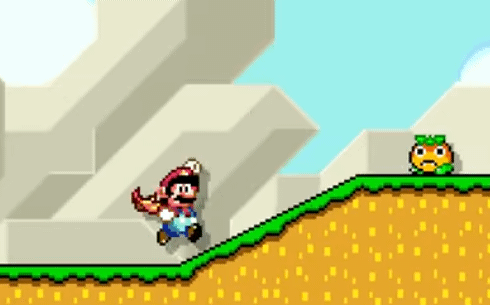
In Super Mario World (and in Mario Maker, my beloved), the run button and the attack button are the same. Pressing the Y button does the attack and holding it lets you run. However, to attack while running, you'll have to release and re-press the button, so you'll lose some speed
...Unless you just press the second run/attack button! This way you can essentially re-press a button without ever having to release it
(Of course, splitting run and attack onto two separate buttons would work too, but I think I could write a whole other post about why I think they don't do this)
also mario wonder got rid of the second button and I'll never forgive them
72 notes
·
View notes
Text
Relics of the Last Scholar

Relics of the Last Scholar is a fantasy, supernatural game with optional romance elements. This game will contain some disturbing happenstances and is not for everyone; it is advised you check the trigger list below before playing the game. If you still wish to continue your adventure, I invite you to become The Last Scholar.
You are a rare specimen indeed: able to interact with the relics of legend, even without being part of the bloodline they belong to, nor having years of training to even reveal the magic essence of these said relics. After a chance encounter, you're recruited to the mysterious Tython-Griffin Institute to train to become a scholar, and seek these relics you have an unnatural ability to interact with.
Your journey will not be easy; in fact, it will be filled with hardships, gut-wrenching decisions, and events that leave you scrambling to recover. Will you be able to live up to the expectations placed upon you, or will you break under their weight?
Trigger List (TBA):
- Vulgar language
-Death, murder
This game will feature multiple customization options, including so far:
Name
One of Three Backgrounds
Preferred pronouns (including inputting your own)
Gender (man/woman/nonbinary, and if you are trans, alongside which body you'd prefer to have if you want sex scenes)
Magic Class
Weapon Proficiency
Other Features:
Book 1 will have three romance options introduced, Book 2 may offer up to three more (Book 2's amount is not concrete yet)
Some romance options will change their gender depending on your preferences.
What choices you make will matter, as does some things you say. Be mindful of your decisions...
Adventure awaiting around ever corner.
TBA
39 notes
·
View notes
Note
Hi! I’m sorry for bringing up a topic that is not fun at all, but I’d ask you to reconsider using Boosty. It’s a service that was created by essentially Russian state-owned VK, then resold multiple times as a standard money laundering scheme to avoid sanctions. But it’s still controlled by the Russian state (it couldn't operate otherwise in Russia, let’s be real) and the foreign currencies that go through it are refilling the Russian monetary fund that Russia uses to buy weapons to keep killing people. Yes, Boosty and similar services contribute a relatively small amount of money, but you deserve to know what your funds will be used for. Russian artists may not have a choice whether to pay taxes to the regime and what services to use, but people in the west do. You will help your russian followers more by just not giving their government any additional money it could use to prolong the war.
Hi, I appreciate you making me aware of that information. I don't have the time to research this right this second, but - at the risk of sounding really cynical - wouldn't any service that operates within russia in any capacity always be fueling war? Leaving me with basically no option but to use none, and hence not only exclude russians, but anyone in a country in a similar legislative and social situation?
I'm not saying there isn't an argument in favor of doing exactly that - but (and again, this is a VERY uninformed opinion right now and I am more than open to being corrected) isn't it somewhat comparable to asking an individual to cut down on their water use, despite how their personal lifestyle-changes could never hold a candle to industrial water waste?
Again, I could be horrifically wrong. Ideally, I would vastly prefer to have everyone use patreon - I don't enjoy managing multiple social medias and I am not in desperate need of money right now. The only reason I want to give people options is because I have received a lot of requests for it and frankly feel bad that they don't get to participate.
I will look more into this later - but in the meantime, I would definitely apreciate input from those affected by this.
108 notes
·
View notes